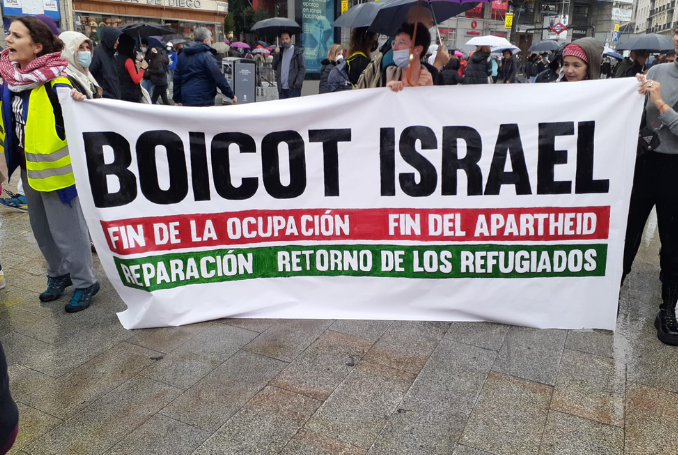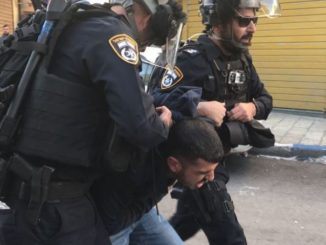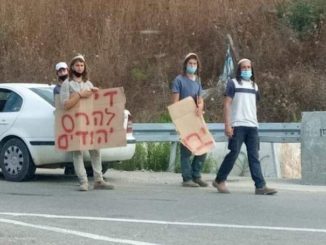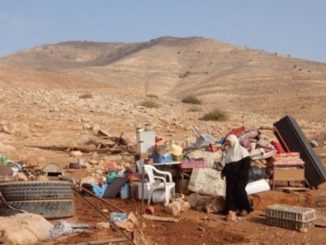
By Blake Alcott
Masar Badil (Alternative Path) is a new movement – as yet a loose group of activists and activist groups rather than a membership organization – working for the liberation of all of Palestine and the recognition of the right of return for all Palestinians in exile.
On Saturday and Sunday, 30-31 October 2021, at simultaneous meetings in Madrid, Saõ Paolo, and Beirut, its core adherents finalized much of its ideology and some plans for action.
About 100 people gathered in Madrid, a good three-quarters of them Palestinian, a good third of them women, and the average age was perhaps 37 years. Discussion and debate were in Arabic, Spanish and English.
At the end of Saturday’s discussions, news from Beirut of their successful conference triggered a rousing quarter-hour of freedom chants. Saturday evening saw several hours of music, magic, awards and dance. On Sunday we marched for Palestine through central Madrid, rallying at La Puerta del Sol.
The Goals
Readers can follow Masar Badil on its website and in other social media, but based on the working papers sent around prior to the conference and on the discussions of Saturday and Sunday, its ideology can be summarised as follows:
1) Palestine shall be liberated and reunified. The Green Line belongs on the trash heap. Partition and its euphemism, the ‘two-state solution’, are unjust, deceptive Zionist notions.
2) Notwithstanding their varied living conditions, Palestinians, wherever they live, are politically equal. They all belong to Palestine and Palestine belongs to them, all possessing the exclusive right to determine Palestine’s future.
3) The Palestinian people is not defined ethnically or religiously, but rather includes atheists, Moslems, Christians and Jews who either themselves or their immediate ancestors lived uninterruptedly in Palestine.
4) All displaced Palestinians have the right to return to their homes and places of origins in Palestine – not just to any old place or just to the West Bank or Gaza Strip. They possess this right not only ethically but in international law. The actual return shall happen for those wanting it. Right of Return and the reason it is needed – the ongoing Nakba – should be more firmly cemented together in international public opinion.
5) The land and property of Palestinians shall be restored to their previous Palestinian owners. This has huge consequences, seeing as in 1947, for instance, about 94% of Palestine was under Palestinian, not Zionist or Jewish, ownership.
6) Compensation for land and livelihoods lost since 1947 is a given.
7) Palestine, at the end of the path, would uphold universal, individual human rights and would be democratic.
The language used by Masar Badil is refreshing: All of Palestine is occupied, not just the West Bank, Gaza Strip and Jerusalem. In most contexts, the present colonialist state ruling Palestine is referred to as the Zionist entity rather than ‘Israel’. Most participants define Palestine as Arabic in linguistic, historical and cultural ways. There is no mincing of words in describing the Palestinian Authority as not only corrupt but, in terms of leading or speaking for Palestinians, illegitimate. Most participants would not limit the term settler to those in the West Bank – a view captured by a graffito of last May: “There is not a city in Israel that was not at one time Sheikh Jarrah.”
What Action?
This vision is shared by many Palestinians. What is the profile of this particular movement?
1) The aim for most participants is a socialist, even ‘revolutionary’ Palestine.
2) The movement is part of the worldwide struggle against imperialism, colonialism and racism.
3) The boycott of the colonial power now ruling Palestine should be a blanket one, with no reference to the Green Line. To the extent that the Boycott National Committee steers the boycott ship conservatively – targeting only a limited number of pro-Zionist actors and as yet underplaying the Sanctions part of BDS – it is arguably harming the cause of all the rights of all the Palestinians. Because Palestinians suffer the economic and political consequences of boycott, it is reasonable that the boycott be Palestinian-led.
4) All legitimate forms of resistance to the occupiers should be pursued and supported.
5) Regarding the relationship between Palestinians and their non-Palestinian supporters, the preliminary working paper called for “Defending the rights of the Palestinian people, and [empowering] our people to be the cornerstone and decision-maker of their national cause, as they are the supreme reference and their rights constitute the source of legitimacy.” At the same time, the struggle is common to other oppressed people, and in local actions, internationals would be equal partners.
6) Financial support should flow into a standing fund to be drawn upon as the need arises, but only individuals and small groups can donate – no governments, corporations or large NGOs. What funding has been necessary to date, and from whom, I do not know.
7) Masar Badil is not, as of now, a membership organization.
8) Resistance must be strong against the degradation of the Palestinian struggle into a fight for humanitarian rights. The struggle moreover must not be subsumed under ‘international law’ which, after all, is largely written by the powerful imperialist powers.
Its Place in the Larger Palestinian Struggle
There is thus much overlap with for instance the Popular Front for the Liberation of Palestine, at least in its earlier years, and the ideology of the currently growing movement for One Democratic State in Palestine, for instance in the form of the One Democratic State Campaign or ODS in Palestine, a group based in Western Europe but with members in Palestine as well.
The working papers also openly built on the principles of George Habash and Ghassan Kanafani, and there is an affinity with the Palestinian National Charter and the pre-1988 PLO.
Many of the meetings’ organizers are activists with Samidoun, the Palestinian Prisoner Solidarity Network. While the freedom of all approximately 4,600 of them is equally important, calling for that of well-known ones such as PFLP leaders Georges Ibrahim Abdullah and Ahmad Sa’adat is important in raising international awareness.
Several concrete projects with Palestinian youth, of which there are tens of thousands in Europe alone, are already underway, specifically in Greece and Berlin. In such places it must be made clear that the PA speaks only for a minority of Palestinians.
Another already-active group is trying to support Palestinian farmers, both economically and by providing security during their work, for instance, in olive groves.
Just across the borders of Palestine, for instance in Lebanon and Jordan, centers of resistance would yield big results, operationally and politically.
Working Groups
On Sunday, after most individuals and the groups, they represent presented themselves, three working groups formed: 1) one for student activism; 2) one for Right of Return; and 3) one for the comprehensive boycott of, divestment in and sanctions of the Zionist state.
Student activists were present not only from Europe but representing about 200 student groups in North America working under the umbrella of the National Students for Justice in Palestine. Connections to students in Latin America, Asia and Africa are of course envisioned.
As for the boycott, we should realize the distinction between BDS as a concept and as a specific organization, the latter being subsumed under the former. The concept itself includes our radical, blanket boycott, and we should distance ourselves when necessary from BDS as it is often enacted by the BDS National Committee. The overall goals, in addition to upping the economic costs to the Zionist entity, should be to isolate it in international diplomacy and ostracise its official and semi-official academics, athletes, artists and journalists.
As for research, studies and publications, the new International Center for Palestine Studies, based in Amsterdam, has already led off with its first book, the Collected Speeches and Interviews of George Habash, 1970-1984.
Open Questions
To my mind, several questions or issues were left open.
1) While the future Palestine is envisioned as democratic in respecting human and political rights, is only a Marxist Palestine worth fighting for? Is a strongly socialist or even communist vision a necessary part of Masar Badil’s vision? Or does independence take priority, with debate over the socio-economic system to follow liberation? Will liberal, more ‘bourgeois’, uncompromising anti-Zionists be welcomed?
2) Is the goal even a state of Palestine, on the borders of historic Palestine, or is the vision one of a larger Arab political entity?
3) It remains to be seen what the relationship will be between Masar Badil and, for instance, the Return Committees, Palestinians Abroad, the Gazan Great March of Return, the PFLP, Fatah, Hamas, One Democratic State, the PLO itself, and last but not least with research-and-publication groups like Al-Shabaka or the Institute for Palestine Studies.
4) What would be the fate and citizenship status of current Jewish Israelis? While some advocate for generously granting them the right to remain in Palestine as normal citizens – albeit with at least 94% of Palestine returning to Palestinian ownership – others would make that conditional on the person’s willingness to give up the pursuit of Zionism. While the Palestinian National Charter regarded as ‘Palestinian’ only “those Jews who had normally resided in Palestine until the beginning of the Zionist invasion” and their descendants, there are humanitarian and practical reasons for including many more. Perhaps this issue should be decided only once Palestine’s re-unification and democratization is a reality.
While there was of course not enough time to develop all questions of ideology, I believe that the sheer logic of envisioning any future Palestine must grapple with these issues.
The final documents of the conference, with amendments and additions to the preliminary documents, are yet to come (soon). I nevertheless hope this report has given an accurate account of the principles, thoughts and questions dominating the proceedings – which added up to an uncompromising, inspiring vision of the realization of all the rights of all Palestinians, self-evidently in a single homeland.
– Blake Alcott is a retired cabinetmaker and ecological economist who has been a solidarity activist since 2010, now living in Zürich. He is Director of ODS in Palestine (UK), an NGO working to make ODS more understandable to the public. His forthcoming book, The Rape of Palestine: A Mandate Chronology, consists of 490 instances of the dialogue, such as it was, between the British and the Palestinians during the years 1917-1948. He contributed this article to The Palestine Chronicle

– Blake Alcott is a retired cabinetmaker and ecological economist who has been a solidarity activist since 2010, now living in Zürich. He is Director of ODS in Palestine (UK), an NGO working to make One Democratic State more understandable to the public. His 2023 book, The Rape of Palestine: A Mandate Chronology, consists of 490 instances of the dialogue, such as it was, between the British and the Palestinians during the years 1917-1948. He contributed this article to The Palestine Chronicle







